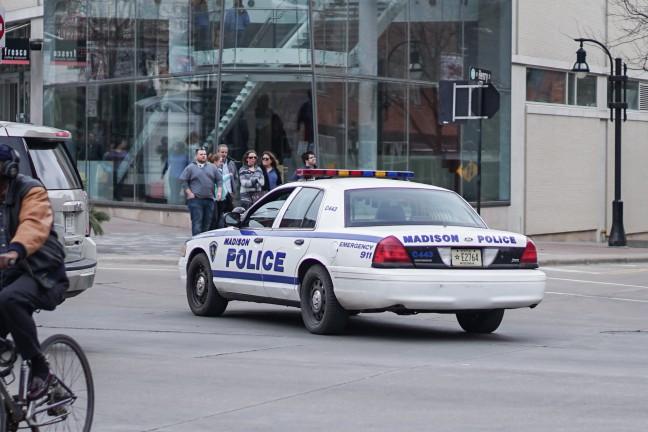Dane County Board members are looking to officially oppose the use of no-knock warrants in Dane County. The County does not have the power to prohibit these warrants, so the proposal calls on the Dane County Sheriff’s Office to stop using these measures.
According to Cornell Law School, a no-knock warrant is a search warrant authorizing police officers to enter certain premises without first knocking or announcing their presence or purpose prior to entering the premises.
This proposal comes after Louisville police officers shot and killed Breonna Taylor in a surprise raid more than a year ago.
According to ABC News, Taylor was a 26-year-old Louisville emergency medical technician studying to become a nurse, who was shot multiple times in March 2020 after a no-knock warrant was approved as part of a narcotics investigation. Police didn’t find any drugs at her home.
According to member of the county board and sponsor of this measure Carousel Bayrd, these types of warrants are abused by law enforcement.
“The Dane County sheriff’s department and other agencies may look at no-knock warrants as something they want for safety reasons because they are concerned that individuals have access to guns. That’s not what no-knock warrants are for. No-knock warrants are used to preserve evidence,” Bayrd said. “It’s outrageous to realize how often they are being used.”
According to a 2007 study from Eastern Kentucky University, the use of no-knock warrants rose sharply during the war on drugs in the 1980s, from being used in the U.S. about 1,500 times per year in the early ‘80s to about 40,000 times per year by the end of the ‘90s.
No-knock warrants are now banned in three states, but there are still an estimated more than 20,000 no-knock warrants issued each year, according to a St. John’s study.
No-knock warrants were used sparingly in Dane County in 2020. According to the Wisconsin State Journal, 11 no-knock warrants were authorized — five for drug offenses, one for armed robbery, four for homicide and one for burglary.
According to Dane County Sheriff Dave Mahoney, no-knock warrants serve as a sort of last resort and are avoided if possible.
“Oftentimes, there are cases where I know we had no-knock warrants, where we were outside, preparing to go execute the warrant. When the individual comes out of the apartment, we follow them, we take them into custody,” Mahoney said. “So if we can get somebody out of the residence, [at a] safe location, we’ll take him into custody and then go back in with a warrant.”
According to Vox, it’s more common for a civilian to get hurt than a police officer, but there are cases of police officers getting shot and killed during SWAT raids. Though civilians are more likely to get killed in SWAT raids than cops, civilians are the ones more likely to get brought into court for murder.
In an email statement to The Badger Herald, University of Wisconsin Management and Human Resources assistant professor Jirs Meuris said a critical examination of the criteria used to determine whether a no-knock warrant is needed is probably more practical and realistic than an outright ban of the practice.
“In general, no-knock warrants are approved by a judge so it depends upon the police department convincing the judge that a no-knock warrant is necessary — there is an important argument that these types of warrants are necessary for officer safety at times, but the question is whether they are over-used relative to the risk,” Meuris said.
According to NPR, the Louisville City Council unanimously banned the use of no-knock warrants on the national level, and Sen. Rand Paul, R-Ky., introduced a bill that would ban the practice for federal law enforcement agents.
Bayrd said Taylor’s case is illustrative of the dangers no-knock warrants pose.
“Breonna Taylor’s boyfriend was in her apartment with her at the time, the police didn’t realize that and they thought only she would be in there,” Bayrd said. “So one that shows you the limitation of no-knock warrants — you’re never for sure who’s in there.”
https://badgerherald.com/news/2021/04/06/covid-19-daily-updates-cases-decline-at-uw-wisconsin-dhs-to-invest-in-promoting-health-equity/
Upon arrival at the residence, officers must see if they can find any information clearly pointing away from the need for a no-knock warrant, according to the Department of Justice.
According to Mahoney, getting rid of these warrants would eliminate the element of surprise, leading to an increase in the use of deadly force.
“The difference is we’d knock on the door. The individual would know we were there before we came through the door and that would provide them the opportunity to get armed and law enforcement to use deadly force,” Mahoney said. “That’s the fear that law enforcement has — it may force a greater number of use of deadly force incidents.
Gov. Tony Evers also proposed a ban on no-knock warrants in his 2021-23 budget, but it will likely be struck down by the Republican Wisconsin legislature, according to the Cap Times.
According to Bayrd, however, this is a bipartisan issue.
“A prohibition on no-knock warrants at the U.S. Congress has been introduced by a Republican. No-knock warrants are prohibited in Florida — a red state, Oregon — a blue state and Virginia — a purple state. So this isn’t Democrat or Republican,” Bayrd said. “This is just acknowledging the purpose of no-knock warrants and the complete abuse of them throughout the country.”
According to the Wisconsin State Journal, Mahoney is retiring May 8, so if the resolution passes, it will be up to the new sheriff, Kalvin Barrett, to decide whether to honor any request from the county. The proposal is scheduled to be on the May 6 agenda.


